
James William Anderson III, known professionally as Bill Anderson, is an American country music singer, songwriter, and television host. His soft-spoken singing voice was given the nickname "Whispering Bill" by music critics and writers. As a songwriter, his compositions have been covered by various music artists since the late 1950s, including Ray Price and George Strait.

Southern Fried is a studio album by American country singer-songwriter Bill Anderson and his band "The Po' Folks". It was released in 1983 on Southern Tracks Records. It was co-produced by Anderson and Mike Johnson. The album marked Anderson's first release on an independent record label after previously recording for MCA Records for many years. The album produced four singles released between 1982 and 1983, all of which charted on the Billboard country songs survey.
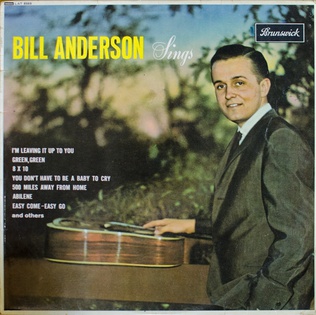
Bill Anderson Sings is a studio album by American country singer-songwriter Bill Anderson. It was released in February 1964 on Decca Records and was produced by Owen Bradley. The album was Anderson's second studio release as a recording artist and included two singles that became major hits on the Billboard country chart. The album itself would also reach positions on the Billboard charts following its release.
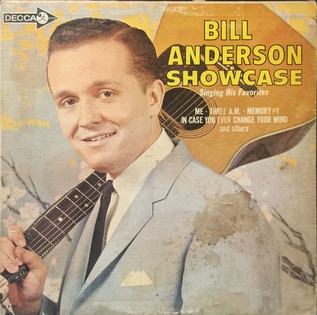
Showcase is a studio album by American country singer-songwriter Bill Anderson. It was released in November 1964 on Decca Records and was produced by Owen Bradley. The album was Anderson's third studio release as a recording artist and second to be released in 1964. It included two singles that became major hits on the Billboard country chart along with subsequent B-sides.

Bright Lights and Country Music is a studio album by Bill Anderson and the Po' Boys. It was released in November 1965 on Decca Records and was produced by Owen Bradley. It was Anderson's first studio album to include dual credit with his band, The Po' Boys. It was his fourth studio album overall. The album included one single release, the title track. This song became a major hit on the Billboard country charts. The album itself also reached charting positions on Billboard shortly after its release.

Christmas is a studio album by American country singer-songwriter Bill Anderson. It was released in November 1969 on Decca Records and was produced by Owen Bradley. Christmas was Anderson's twelfth studio recording and also his first album of Christmas music. It was also his second studio album released in 1969.

Bill Anderson Sings for "All the Lonely Women in the World" is a studio album by American country singer-songwriter Bill Anderson. It was released in May 1972 on Decca Records and was produced by Owen Bradley. It was Anderson's nineteenth studio recording to be released during his music career. The album included one song that became a major hit for him in 1972, the title track. The album would also reach positions on national music charts at the time.

A Place in the Country is a studio album by American country singer-songwriter Bill Anderson. It was released in 1986 and was produced by Mike Johnson. The album marked Anderson's 33rd studio recording to be issued during his career. It was also his third independent studio album to be released. It also included three singles that were released and became charting singles on the Billboard country survey.
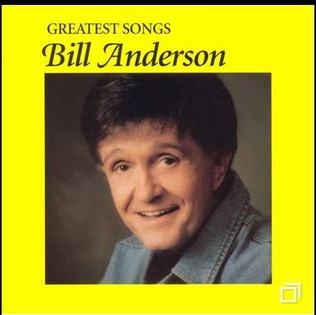
Greatest Songs is a studio album by American country singer-songwriter Bill Anderson. It was released November 19, 1996, on Curb Records. It was his 35th studio recording in his career as a recording artist. It was also his third album issued for the Curb label. Although titled Greatest Songs, the album actually contained re-recordings of songs originally recorded in decades prior.
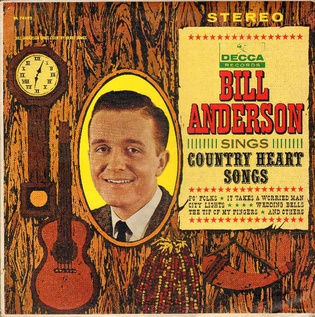
Bill Anderson Sings Country Heart Songs is a compilation album by American country singer-songwriter Bill Anderson. It was released in January 1962 on Decca Records and was produced by Owen Bradley. Despite it being a compilation, the project was Anderson's debut album release as a recording artist. It featured several of his early hits with the Decca label and included one song that would later be issued as a single in 1962.

Bill Anderson's Greatest Hits is a compilation album by American country singer-songwriter Bill Anderson. It was released in October 1967 via Decca Records and was produced by Owen Bradley. The album was Anderson's third compilation recording released in his career and first album of greatest hits. Twelve tracks were included on the collection that had been previously released. The album itself also reached major record chart positions.
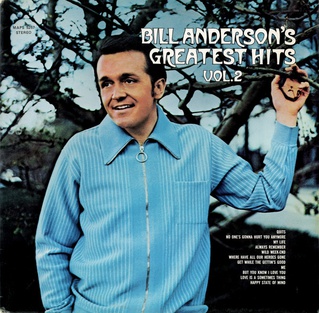
Bill Anderson's Greatest Hits, Vol. 2 is a compilation album by American country singer-songwriter Bill Anderson. It was released in September 1971 on Decca Records and was produced by Owen Bradley. The record was Anderson's fourth compilation released in his recording career and contained one single that became a major hit in 1971. The album itself included some his biggest hits from the era.
"Ninety-Nine" is a song written and recorded by American country singer-songwriter Bill Anderson. It was released as a single in June 1959 via Decca Records and became a major hit.
"Dead or Alive" is a song written and recorded by American country singer-songwriter Bill Anderson. It was released as a single in October 1959 via Decca Records and became a major hit.
"Walk Out Backwards" is a song written and recorded by American country singer-songwriter Bill Anderson. It was released as a single in October 1960 via Decca Records and became a major hit.
"8×10" is a song written by Bill Anderson and Walter Haynes. It was first recorded by American country singer-songwriter Bill Anderson. It was released as a single in 1963 via Decca Records and became a major hit.
"Me" is a song written by Alex Zanetis that was first recorded by American country singer-songwriter Bill Anderson. It was released as a single in 1964 via Decca Records and became a major hit.
"Love Is a Sometimes Thing" is a song written by Jan Howard. It was first recorded by American country singer-songwriter Bill Anderson. It was released as a single in 1970 via Decca Records and became a major hit the same year.
"Easy Come – Easy Go" is a song written and first recorded by American country singer-songwriter Bill Anderson. It was released as a single in 1963 via Decca Records and became a major hit.

The singles discography of American country singer-songwriter Bill Anderson contains 84 singles, three promotional singles, 6 other charted songs and four music videos. After signing to Decca Records in 1958, Anderson released a series of early singles that became hits, reaching the top ten and 20. This included "That's What It's Like to Be Lonesome" (1958), "The Tip of My Fingers" (1960) and "Po' Folks" (1961). The following year, he reached number one on the Billboard Country and Western Sides chart with "Mama Sang a Song." In 1963, Anderson released his most commercially successful single, "Still." The song was his second number one country single and his first top ten hit on the Billboard Hot 100, climbing to number eight. His follow-up single, "8×10" reached similar crossover success. Anderson released 11 more top ten country hits during the rest of the decade. This included the number one singles "I Get the Fever" (1966) and "My Life " (1969). He also had a number one hit with Jan Howard called "For Loving You" in 1968. Anderson also had top ten hits with "I Love You Drops" (1965), "Happy State of Mind" (1968) and a cover of "But You Know I Love You" (1969).













